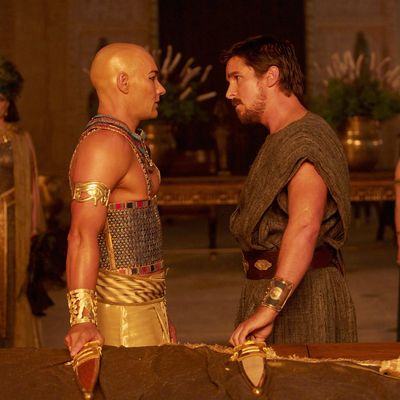
Exodus: Gods and Kings is as uneven as Ridley Scott’s career; at times, it seems to be a journey through the director’s greatest strengths and weaknesses. The good news is that his strengths eventually win out; the bad news is all the awkward storytelling and botched character interactions we have to wade through to get to the good stuff. Once we do, though, Exodus is a hoot.
The Moses tale is familiar to pretty much everybody, but leave it to Scott, who has always favored mood and imagery over narrative and character, to mess up the initial story beats. We begin with Moses (Christian Bale) and his adoptive brother Ramses (Joel Edgerton) preparing to attack the army of the Hittites. On the eve of battle, their father, the current pharaoh (John Turturro, resisting the urge to yell, “It don’t mattah to Jeezus!”), learns of a prophecy that says that someone will save someone’s life, and that the person who did the saving will become king. That’s about as vague as a prophecy can get, but it’s enough to send Ramses spiraling into paranoia as soon as Moses saves him during the bloody melee with the Hittites.
Despite that setup, Scott and his cavalcade of screenwriters never quite crack Ramses’ motivations. He’s suspicious, yet supposedly torn by his affection for Moses, even though we rarely sense said affection. They also can’t quite crack Moses’ awakening to his Jewish heritage. He initially hears of it in the town of Pithom from Nun (Ben Kingsley), an enslaved Israelite and father of the rebel Joshua (an eerily underused Aaron Paul), but he doesn’t believe it. However, the abject conditions of the Hebrew slaves in Pithom do get Moses’ blood boiling, and for a while, the film tries to juggle our hero’s skepticism about his lineage with his disillusionment over the way things are being run; but the results are more convoluted than nuanced. In truth, the stodginess of these early scenes almost consume the entire film; I spent much of this first hour alternately confused, sleepy, and bewildered at how low the great Ridley Scott seemed to have fallen.
And then, God shows up.
Here he comes to Moses in the form of a young boy, Malak (Isaac Andrews). Their interactions are curious, almost hostile, as Malak pushes Moses toward greater extremism in his effort to free the Jews from enslavement. Moses stands up to Malak and even expresses disagreement with the deity’s ruthless tactics. Their exchanges at times feel like a debate between equals, and God even suggests that Moses is free to leave whenever he wants.
Much has been made of the fact that Ridley Scott himself is a nonbeliever, but that shouldn’t really surprise anybody. Two of the greatest Christ movies (Pier Paolo Pasolini’s The Gospel According to Matthew and Roberto Rossellini’s The Messiah) came from atheists, and as my pal Steven Greydanus, film critic for the National Catholic Register, has argued, some of the best religious films have been made by nonbelievers. Maybe it’s because skeptical filmmakers have to convince themselves, too, along with their imagined viewers. Even the most familiar story starts from zero in its retelling and weaves its world anew.
Once Moses has his mission, Exodus comes breathtakingly alive. As the plagues descend upon Egypt, Scott lets loose a carnival of horrors, each building on the previous one. Armies of crocodiles swarm the Nile, feasting on each other, which turns the water red with blood, which then pushes frogs out of the river and spreads flies and disease. It’s spectacular, terrifying, visceral stuff, but it doesn’t deny the Egyptians their humanity, either: The plagues don’t discriminate between bad royalty and innocent commoners.
That leads to the exodus part of Exodus, as Moses leads the Jews out of Egypt with Ramses in pursuit. The rockslides and waves and thundering armies are eye-poppingly impressive, and the film finally becomes what it’s been trying to be all along: the first honest-to-goodness biblical epic since the days of Cecil B. De Mille and George Stevens. (Let’s not miss, however, the irony that such traditionalism is being delivered to us by Ridley Scott, who once seemed the most modern of directors.)
That spirit of old-fashioned spectacle — corny, earnest, indulgent, insistent, kitschy — is probably the best way to approach Exodus. It’s also the best way to approach some of the frustratingly lily-white casting choices. Yes, it’s probably true that Scott needed someone like Christian Bale to make sure he could get his film made. And casting a Middle Eastern actor — a “Mohammed so-and-so from such-and-such,” in the director’s immortally tin-eared phrasing — as Ramses the bad guy might have been dubious in our politically sensitive times. But, speaking as a bit of a “Mohammed-so-and-so” myself, I’m not sure Joel Edgerton cavorting around in orangeface is any less offensive.
That said, Scott has at least loaded up part of his supporting cast with more diverse faces, including the Iraqi-Danish actor Dar Salim, the Iranian actress Golshifteh Farahani (the riveting lead of Ashghar Farhadi’s About Elly, and the love interest in Scott’s Body of Lies), the Egyptian actor Ghassan Massoud (who memorably played Saladin in Scott’s Kingdom of Heaven), and the Indian-British actress Indira Varma (Luther, Kama Sutra). Maybe in the inevitable director’s extended edition, they’ll actually have some real lines.


